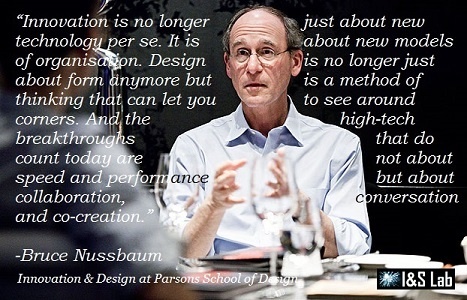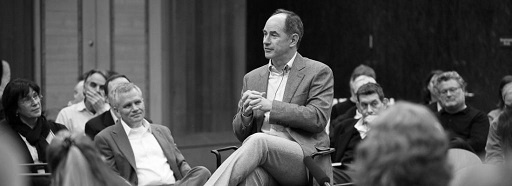Over the recent years, organizations had to navigate a multi-dimensional transformation of their ecosystem that has impacted their modes of collaboration, communication and organization.
”Because digital transformation is more of a leadership challenge than a technical one, it’s essential to focus managerial attention on people’s desire to change and the organization’s ability to change.” – George Westerman
These radical changes are occurring both on the digital and human dimension of modern organizations, and they are de facto redefining the way innovation, strategy and management are shaping organizations in the 21st century.
innovation 2.0

What if we give everyone a voice, a virtual seat at the table? Imagine we ask people for their unique perspective. Invite them in to share the world as they see it, and “listen”. Allowing organizations to design and implement the Enterprise 2.0 from the ground up.
“Innovation, like creativity, is about solving problems“
“This is largely a group effort. People are the base of each company. Our job [as leaders/managers] is to bring out the best in all of those people. There are a lot of things that have to be figured out. One of those things is removing power from the room. Those who are trying to solve the problems are in a very vulnerable state, because the problems are unsolved when they start. There is a need to ensure that the least powerful person in the room feels safe to talk.” — Ed Catmull, co-founder of Pixar
strategy 2.0
We believe the future of organizations should be designed in collaboration with the bottom of their pyramid. Digital Transformation is all about this new paradigm.
”A modern view of strategy is about exploration and experiments, a search process of trial and error, openness to what’s possible. […] Most people believe that the role of leaders is to choose strategic directions, then persuade others to follow them. [But] what an organization becomes emerges from the sense-making relationships of its members, rather than being determined by the choice of a few powerful individuals.” — Esko Kilpi
”The old business paradigm: senior leaders formulate strategy, the rank and file executes the strategy. If we’re going to make better decisions we need better paradigms.” — Roger L. Martin

Strategy as learning
“That requires senior executives to engage in an ongoing dialogue with Operations across all levels and departments, [to allow] a greater flow of information from customers to executives, more experiments. [This] alternative perspective on strategy and execution —that we argue is more in tune with the nature of value creation in a world marked by V/U/C/A — conceives of strategy as an hypothesis rather than a plan.” – Amy C. Edmondson / Paul J. Verdin
management 2.0
All organizations are not necessarily and equally aware on the magnitude and even the nature of that change that is impacting Management: one being already under way with regards to agile management, and another already on the table with regards to human management.
“What is changing is the practice of management… We are seeing a lot of experiments with new ways of working. It’s not only the Ali Babas, the Amazons and the Googles, but also a lot of traditional companies who are experimenting. It’s not just a story of digital innovation. It’s a story of new business imperatives, causing companies to do different things.” — Julian Birkinshaw at Global Peter Drucker Forum (Nov 2019).

We believe there is a need for innovation and transformation that starts with the way organizations and people work.
Shaping the workplace of the future means we also need that top management engage people at a higher levels of collaboration, cooperation and participation.
”What is required in today’s creative economy, is a radical rethink of our top-down, tradition-encrusted management principles and processes. The challenge: building organizations that are as innovative as they are efficient, as passion-filled as they are pragmatic… This is not merely about implementing a new practice, process or structure. Instead, we have to start with a new set of management principles.” — Gary Hamel (London Business School)
“Creating a future is different from “getting buy-in” on a corporate vision statement. Buy-in often extracts little more than compliance from workers, whereas a future that employees feel a part of and find compelling unleashes commitment and enthusiasm.” — Steve Zaffron/Gregory Unruh
people part of change
Digital transformation is providing anyone, at any level of the organization, with the unique opportunity to take part in their enterprise transformation and become internal facilitators of innovation & strategy.
“Innovation is the result of how diverse, whole and inclusive we are. We have no choice, in this complex world, but to figure out how to invite in everybody so we can be truly innovative. Those that we fail to invite into the creation process will show up as resistors and saboteurs. [We need to] bring people together to talk to one another, listen to one another, reflect on the learnings.” — Fateme Banishoeib

“We believe people are willing to change, they just don’t want to be changed; they want to be part of shaping their future.”
— Bryan Walker, IDEO Partner & Managing Director
Employees want to be heard
”They want to be owners with a voice contributing to the strategy of the organizations we support. From top to bottom, each of us brings a unique set of experiences and organizational wisdom that is yearning to be tapped. Give us an opportunity to share what we know and debate the important issues. Involve us in planning, decision making, innovation, and strategy.” (FastCompany)

visit our Management 2.0 Lab on Twitter
copyright © 2019, all rights reserved
